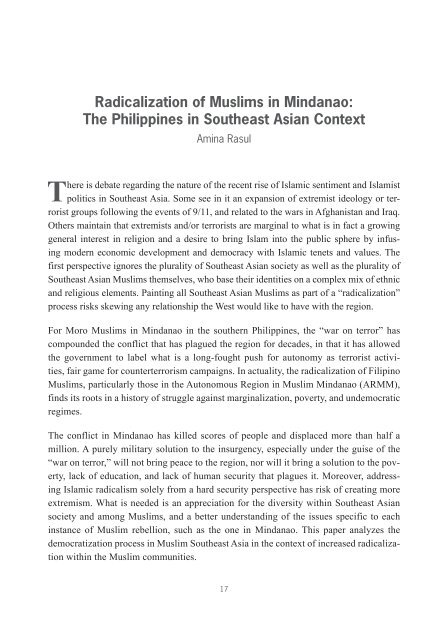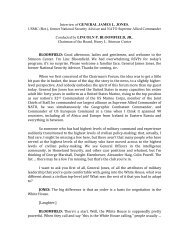Islam and Politics - The Stimson Center
Islam and Politics - The Stimson Center
Islam and Politics - The Stimson Center
You also want an ePaper? Increase the reach of your titles
YUMPU automatically turns print PDFs into web optimized ePapers that Google loves.
Radicalization of Muslims in Mindanao:<br />
<strong>The</strong> Philippines in Southeast Asian Context<br />
Amina Rasul<br />
<strong>The</strong>re is debate regarding the nature of the recent rise of <strong>Islam</strong>ic sentiment <strong>and</strong> <strong>Islam</strong>ist<br />
politics in Southeast Asia. Some see in it an expansion of extremist ideology or terrorist<br />
groups following the events of 9/11, <strong>and</strong> related to the wars in Afghanistan <strong>and</strong> Iraq.<br />
Others maintain that extremists <strong>and</strong>/or terrorists are marginal to what is in fact a growing<br />
general interest in religion <strong>and</strong> a desire to bring <strong>Islam</strong> into the public sphere by infusing<br />
modern economic development <strong>and</strong> democracy with <strong>Islam</strong>ic tenets <strong>and</strong> values. <strong>The</strong><br />
first perspective ignores the plurality of Southeast Asian society as well as the plurality of<br />
Southeast Asian Muslims themselves, who base their identities on a complex mix of ethnic<br />
<strong>and</strong> religious elements. Painting all Southeast Asian Muslims as part of a “radicalization”<br />
process risks skewing any relationship the West would like to have with the region.<br />
For Moro Muslims in Mindanao in the southern Philippines, the “war on terror” has<br />
compounded the conflict that has plagued the region for decades, in that it has allowed<br />
the government to label what is a long-fought push for autonomy as terrorist activities,<br />
fair game for counterterrorism campaigns. In actuality, the radicalization of Filipino<br />
Muslims, particularly those in the Autonomous Region in Muslim Mindanao (ARMM),<br />
finds its roots in a history of struggle against marginalization, poverty, <strong>and</strong> undemocratic<br />
regimes.<br />
<strong>The</strong> conflict in Mindanao has killed scores of people <strong>and</strong> displaced more than half a<br />
million. A purely military solution to the insurgency, especially under the guise of the<br />
“war on terror,” will not bring peace to the region, nor will it bring a solution to the poverty,<br />
lack of education, <strong>and</strong> lack of human security that plagues it. Moreover, addressing<br />
<strong>Islam</strong>ic radicalism solely from a hard security perspective has risk of creating more<br />
extremism. What is needed is an appreciation for the diversity within Southeast Asian<br />
society <strong>and</strong> among Muslims, <strong>and</strong> a better underst<strong>and</strong>ing of the issues specific to each<br />
instance of Muslim rebellion, such as the one in Mindanao. This paper analyzes the<br />
democratization process in Muslim Southeast Asia in the context of increased radicalization<br />
within the Muslim communities.<br />
17

















